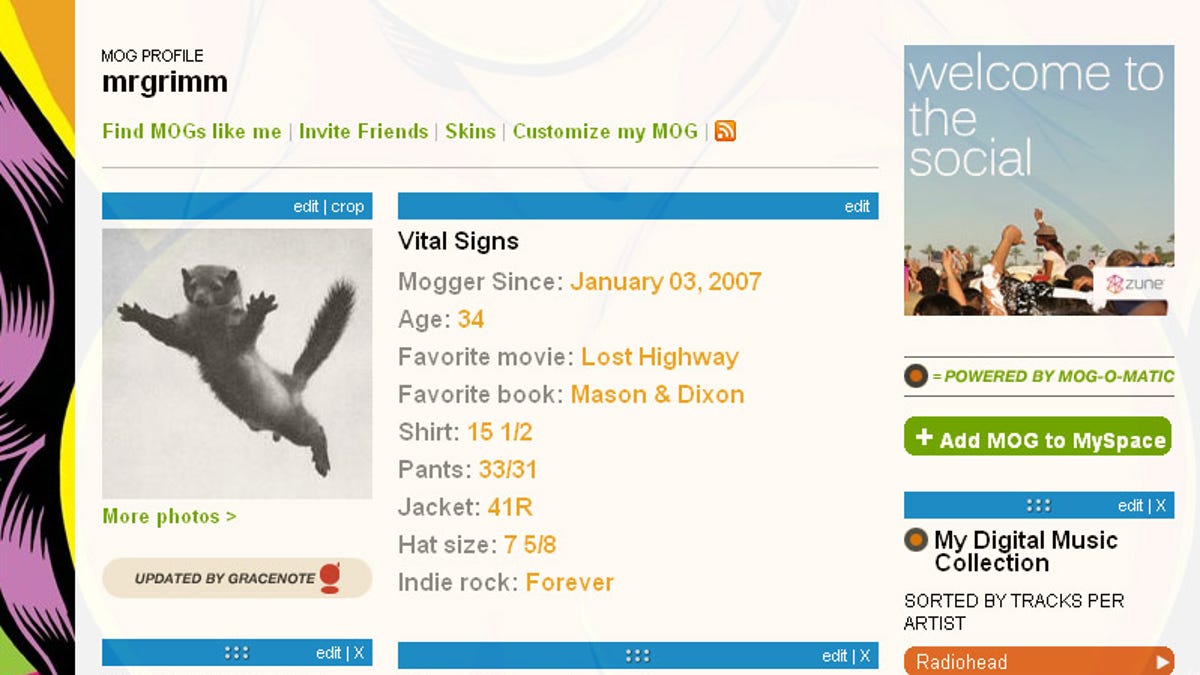Mog: Friendster for music lovers
The social-networking/music-recommendation site Mog.com uses a Friendster-like approach for connecting "Moggers" and a downloadable component that automatically updates your own Web page with your current tunes.

The social-networking/music-recommendation site Mog.com offers a Friendster-like network for connecting "Moggers," an old-school collective blogging system that puts every contributing member in the spotlight, albeit briefly, and a downloadable component that automatically updates your Mog page with your current tunes. The fun and easy method of sharing musical favorites and recommending new gems has already developed a well-informed and well-behaved user base that even includes a few indie superstars.
Mog.com launched back in June 2006 and has attracted an interesting assortment of professional rockers. Among the semifamous musicians with their own Mog pages are Ben Gibbard of Death Cab for Cutie and Postal Service, indie rockers Deerhoof, Matthew Caws of Nada Surf, former Minutemen cofounder Mike Watt, Portastatic (a.k.a. Mac McCaughan of Superchunk), and Tom Gray of Gomez. As I check out Mog.com right now, there's a post by Brian Vander Ark of the Verve Pipe on the main page. Of course, we've all seen spoofed accounts on Friendster, but these posts and pictures seem authentic enough.
Aside from the standard social-networking features you'd expect such as multiple photos, personal descriptions, and connections (called "My Trusted Mogs"), the most important part of the service is the dynamic content piped in automatically from the Mog-o-matic, a downloadable client that syncs your local music with your Mog page. You choose which files you'd like to include in your digital-music library, and then the Mog-o-matic, when running, will update the stats on your Mog page.
Users concerned with privacy are definitely wise to question whether a third party should have access to info about your personal music files, and everyone even considering using the service should first read Mog's entire privacy policy. Most importantly, you should note this section about the Mog-o-matic:
MOG uses technology that provides you with the ability to show others your musical collection and your musical listening habits. MOG-O-MATIC retrieves this contextual information and stores a Title Unique Identifier ("TUID") on your computer. The TUID allows MOG-O-MATIC to retrieve this information efficiently. Data regarding the specific content you are playing is retained until you have removed your MOG account. You have the option to turn this feature off by right clicking on the MOG icon in your system tray on a PC or via System Preferences on your Mac. MOG-O-MATIC data is collected to serve targeted advertising to you. [Emphasis mine.]
So, no, the people at Mog.com aren't likely running this service simply out of the goodness of their hearts. The primary purpose seems to be gathering marketing data. The Mog-o-matic made it simple for me to specify which files I wanted to "Mogify," but it also seems to automatically scan my entire "iTunes library" every time it starts up.
The site lacks the streaming-music picks of the slick Pandora player or even the more complex recommendation features of last.fm, but what it does offer is compatibility with numerous media players, including my favorite Quintessential Player. The Mog page itself is limited to a standard three-column layout, and you can drop and drag most of your widgets wherever you'd like. The service uses ID3 tags and the Gracenote database to identify the songs in your personal library and offer a 30-second sample that's immediately playable from the Web site, which is a welcome feature when stumbling upon unfamiliar artists. When applicable, there are also links to music videos.
The privacy issues around sharing any local file information are likely to keep Mog-o-matic from widespread use, but that could be a blessing in disguise for the community. Privacy issues aside, the Mog.com service is addictively fun, and the Moggers themselves are intelligent and communicative...so far. Blog posts range from insightful industry observations and heartfelt raves to self-centered babble, but a Digg-like voting system in the "Mog-o-sphere" assures that the best posts will usually get noticed. My personalized music recommendations via "Mogs Like Me" have been decent. However, I'm baffled how anyone could suggest Stevie Ray Vaughan to me with a straight face.

